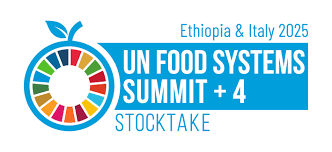Global Push for "True Value of Food" to Reshape Food Systems
- nlacey75
- Aug 4, 2025
- 2 min read

Addis Ababa, Ethiopia – For the second time since the 2021 UN Food System Summit (UNFSS), a pivotal global summit with the purpose to stock-take progress in the past 4 years, was organized in Addis Ababa, called UNFSS+4, and co-hosted by the governments of Ethiopia and Italy. During three days, heads of state and government, the UN-Secretary-General and national delegations, civil society groups, indigenous representatives, small holder farmers and private sector actors reflected on progress and reflected on strengthening of accountability, unlocking finance and investment and building global momentum.
On 28 July 2025, the UNFSS+4 side-event titled "Measuring What Matters: True Value of Food for the Transformation of the Italian Agrifood Chain”, convened experts to champion the True Value of Food as a critical tool for building sustainable and resilient food systems. As the FAO annual State of Food and Agriculture (SOFA) reports 2023 and 2024 revealed we are facing an estimated $12 trillion in annual hidden food system costs.
"Maximizing the value of food systems’ is not just a number-crunching exercise. It is a gateway to better policies, smarter investments, and a more just and sustainable future. If we can align around this way of seeing and valuing food systems, we can build a future where healthy food, thriving communities, and a resilient planet are not the exception, but the norm."
Jenn Yates, TCA Accelerator, representing the UNFSS coalition True Value of Food Initiative (TVoFI).
Professor Riccaboni of the University of Siena highlighted the urgent need for better metrics to assess food system interventions, reduce negative impacts, and enhance positive contributions. The discussions underscored the necessity of a holistic and collaborative approach, involving all food chain stakeholders from farmers to consumers. And to increase international exchange on methods to value, both the hidden costs and hidden revenues of food.
The second panel showcased industry leaders, including Ferrero and Illy Caffè, detailing their sustainability efforts. Ferrero's Francesco Valentin stressed a data-driven approach, smart partnerships, and consumer focus across their supply chains. UNIDO presented its ACT Coffee initiative, working to transform the coffee sector in African producer countries by addressing climate, compliance, research, and social pillars. Illy Caffè emphasized its long-standing commitment to integrated supply chain sustainability and grower communities. Save the Children highlighted its partnership with Ferrero to mitigate child labor risks in cocoa supply chains.
In conclusion, participants reiterated that enhancing positive environmental and societal impact throughout their value chains, and mitigating negative ones, requires a decision-making approach that considers the full array of costs and benefits, with TVoFI being a key enabler. Significant developments are underway – in Italy and elsewhere around the globe – to mainstream this approach in order to transform food systems The TCA Accelerator recently convened 170 leaders in Rome to define the actions needed across sectors to scale greater TCA implementation by 2030 and to secure commitments to fulfill this ambitious goal. Substantial work is also being done to improve sustainability in cocoa and coffee value chains through collaboration between private companies, civil society, and research in low and middle-income countries. The event emphasized the importance of long-term relationships, quality, innovation, and continued collaboration for a more sustainable food future.

Comments